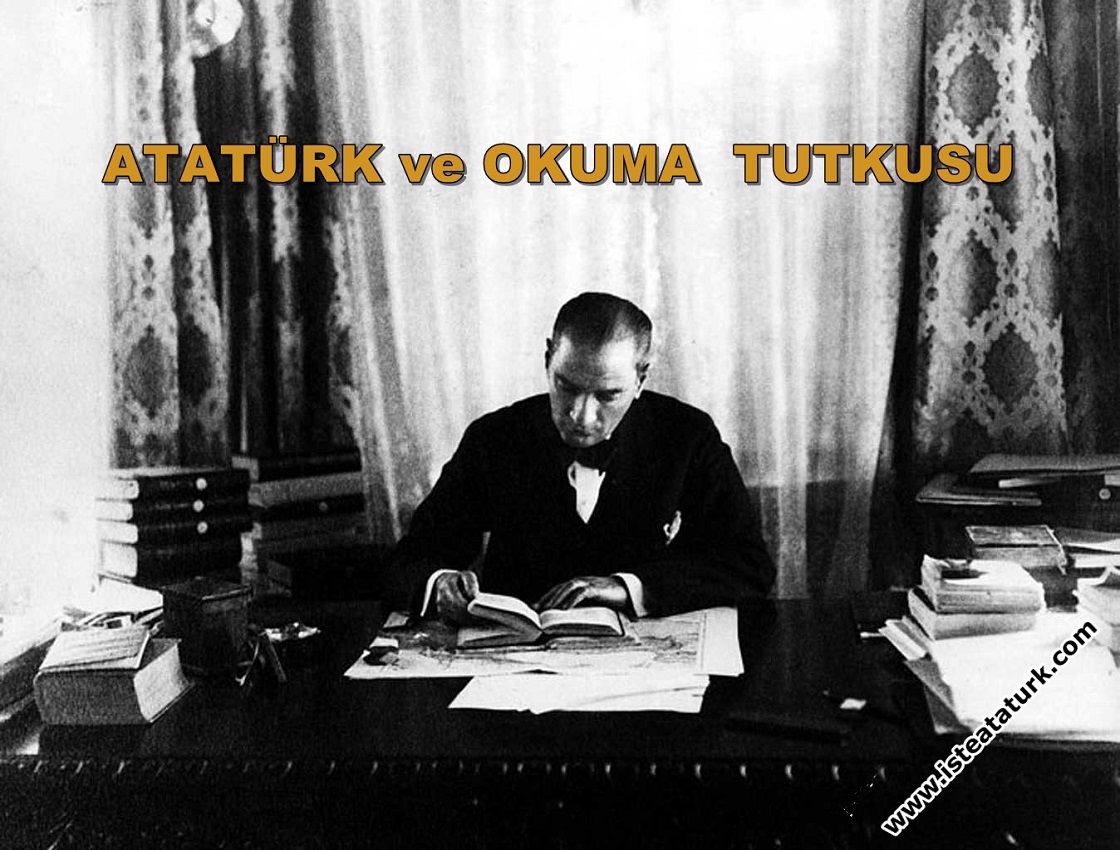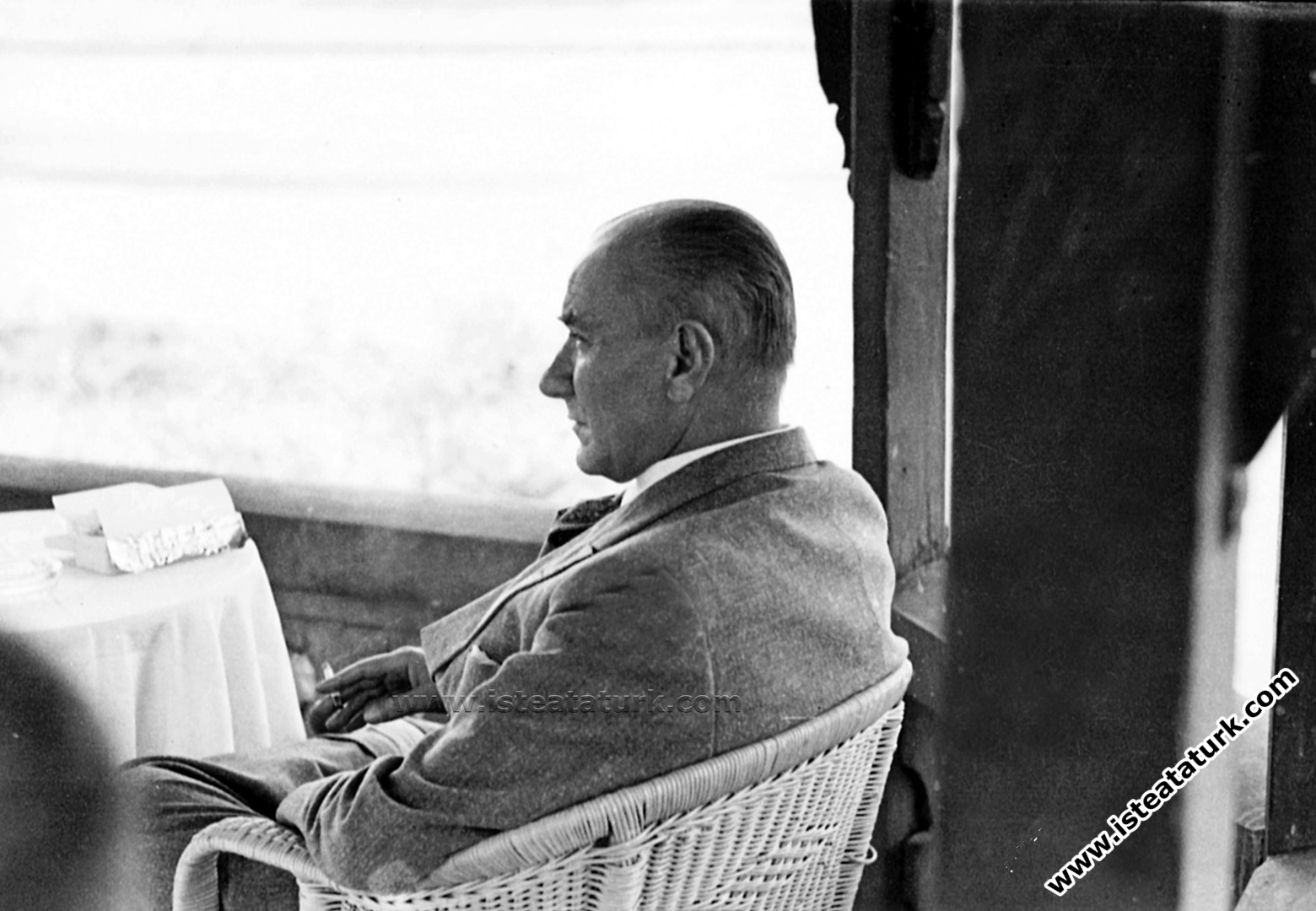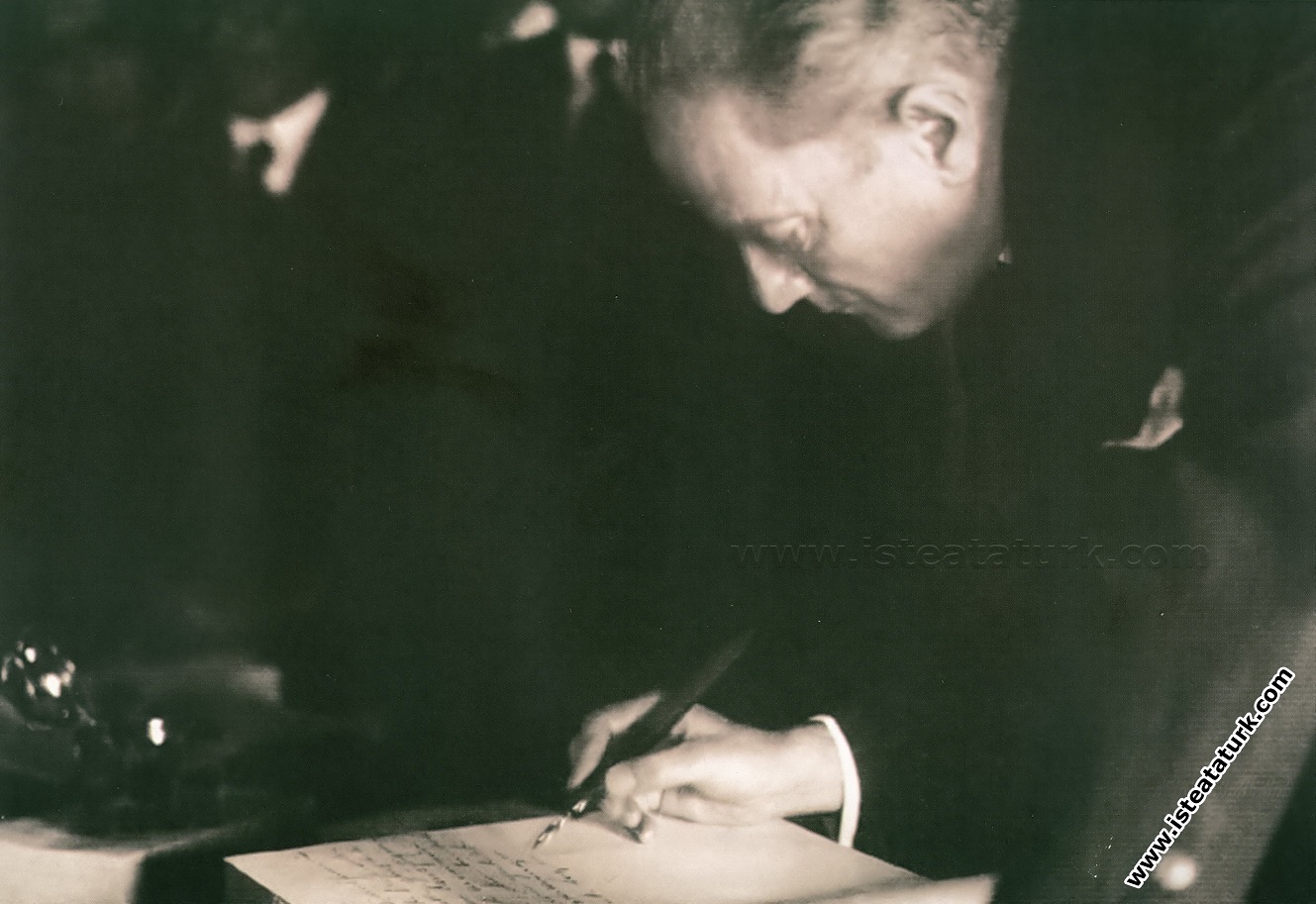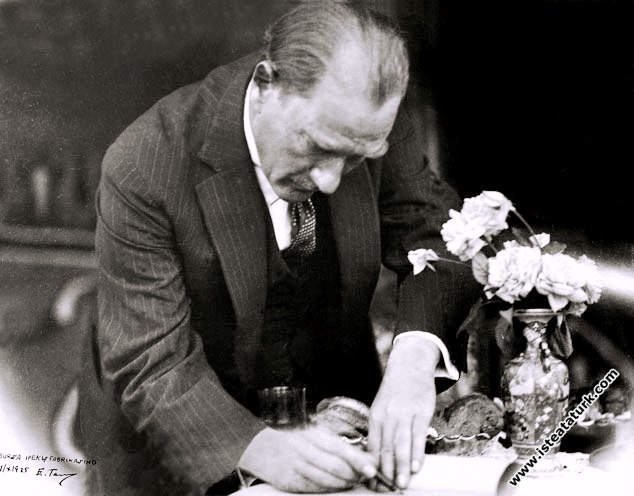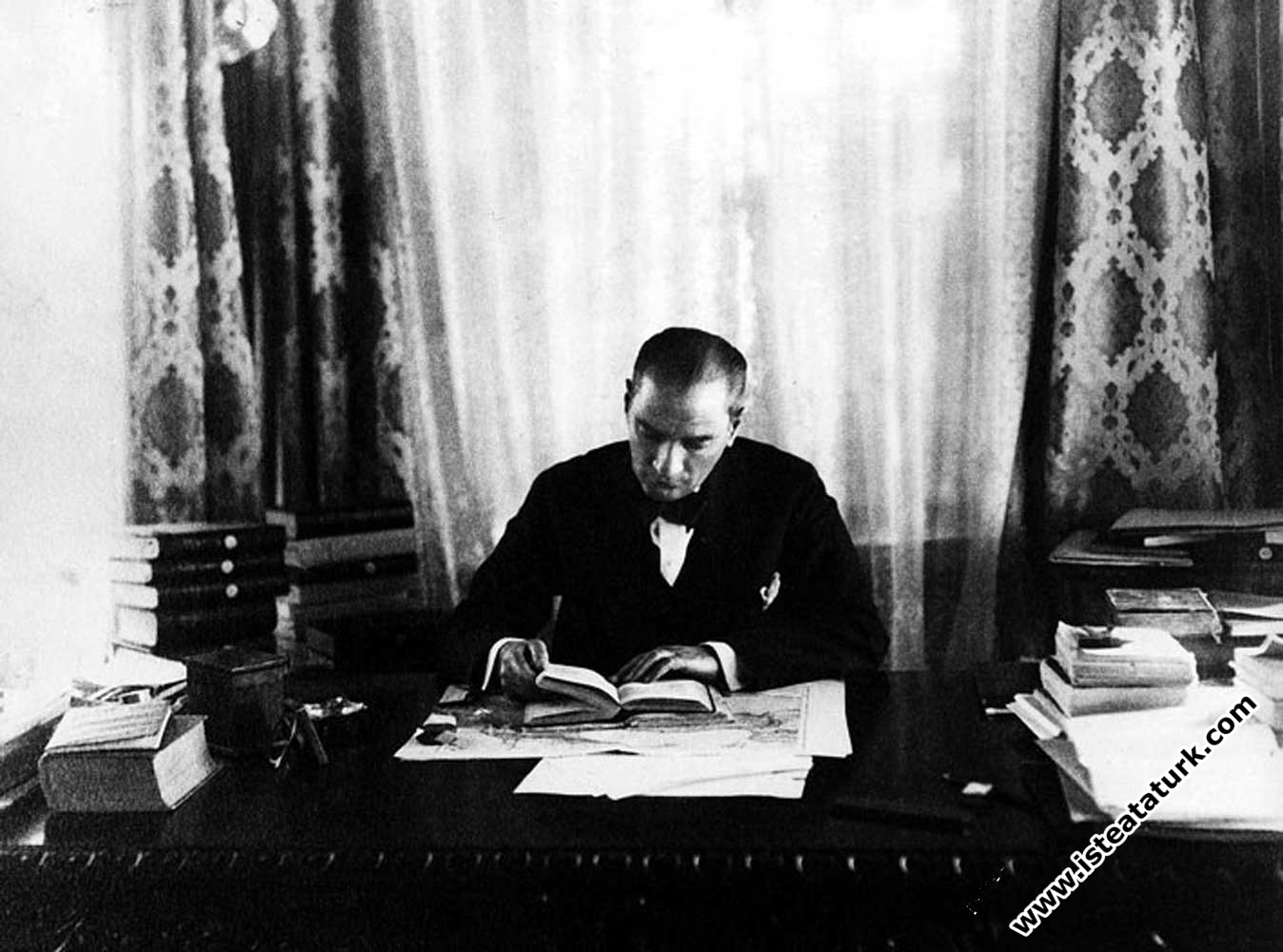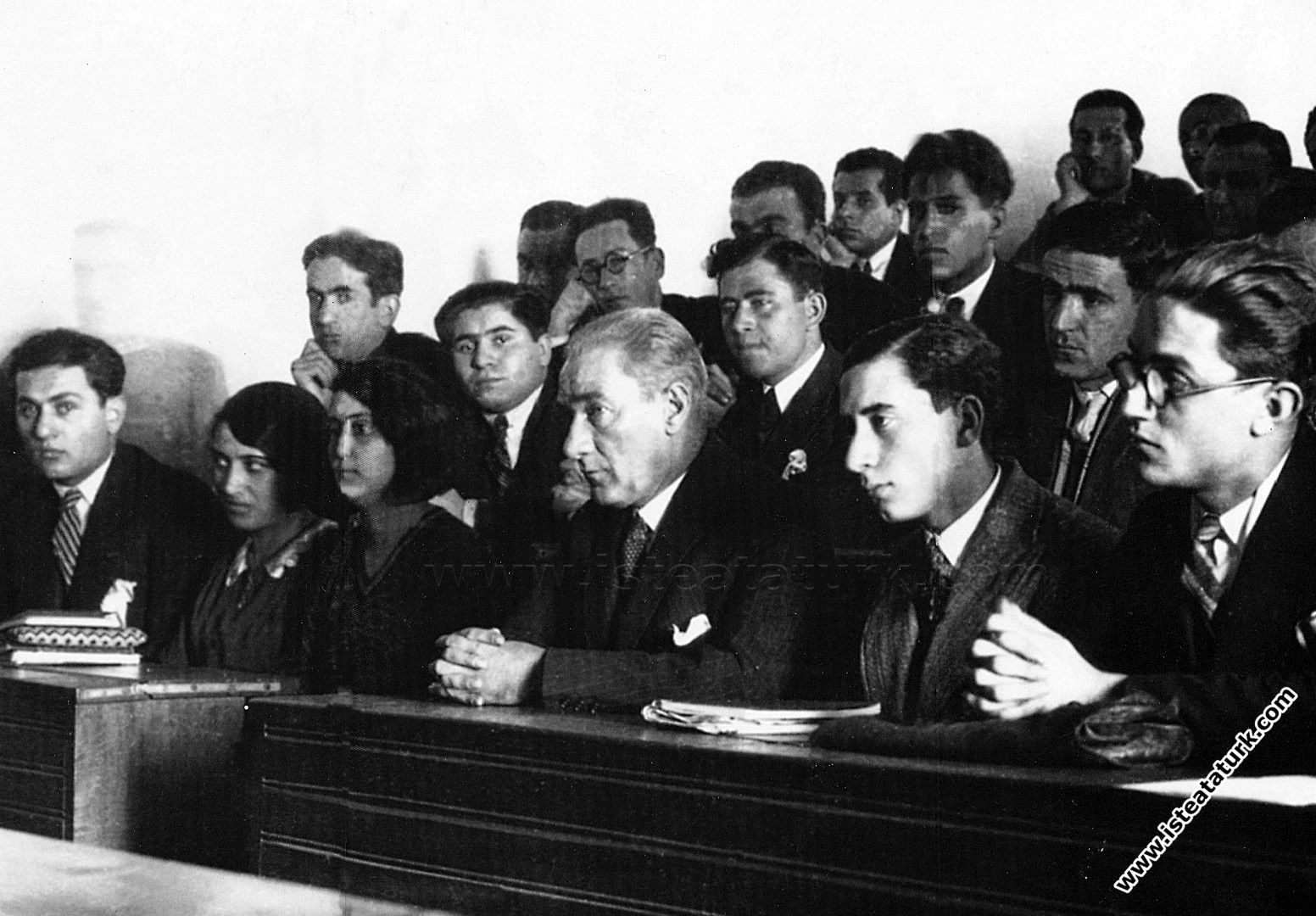
Atatürk's Perspective on Education and Universities
Character Size
Atatürk's Perspective on Education and Universities
Atatürk's Perspective on Education and Universities
Various attempts have been made to improve our education system from time to time since the Ottoman period. Even in this period, in order to get rid of the deadlock in education, it was requested that the national education policy be dominant in educational institutions, and the current that it would not be possible to be a true nation unless the "people, madrasahs and students" groups seen in the Ottoman society until these dates began to gain strength.
In the 18th century, the result of contacts with the West, III. During the reign of Selim, reform movements started. Reforms were first handled in the military field and then tried to be carried out in the medical and technical fields. III in the field of education. Rather than Selim II to a large extent. During the Mahmud period, steps were taken for the first major educational reforms. II. Mahmud, in the face of the necessity of reorganizing the military and civil administration, found it necessary to make these reforms at the high school level first. Therefore, in 1834, he established a military school and later a commercial school under the name of Mekteb-i Ulum-i Harbiye. Also, III. He developed the Naval Academy, the foundation of which was laid during the reign of Selim I.
When the Tanzimat period was entered, this time, II. It turned out that Mahmud started the reform movements he wanted to make in the education system at the high school level. Because, it has been seen that the information given to students at primary school level is very insufficient. Therefore, this time with the Tanzimat reform movements in education were reduced to the primary school level first. Children who received a good education in primary schools and especially learned the basics of the Turkish language were asked to be sent to higher schools. Therefore, literacy, calculus and the foundations of Islam would be taught in primary schools, and new books would be written for these courses. In high schools, besides Arabic and Persian, Turkish, religious knowledge, Ottoman History, geography, arithmetic and geometry courses were included in the curriculum1.
It was revealed after a very short time that these reforms, which were made and tried to be made in primary and secondary education, did not fit into place. The only reason for this was that the instructors who would give these courses to the students were not sufficient. For this reason, this time the opening of a teacher training school (Dar-ül-muallimin) was carried out, and 31 of these teacher schools were established until 1908. Shortly after the opening of teacher schools, the establishment of a university (Darül-fünûn) was discussed. We see that only female students were accepted to this university in 1914.
III. In a very short time, the necessity of having a law, an institution engaged in this business, in order to carry out the education reforms that started from the time of Selim, emerged in a very short time. For this reason, the General Education Commission was established in 1846. At the same time, the Ministry of Education was established in 1857 to coordinate these works at the highest level, after which many schools were opened for the realization of various purposes.
The law dated September 2, 1869, which was put forward and supported by Mithat Pasha, brought a continuity to the education system, which showed great improvement after many years. In this law, the differences between schools established directly under the supervision of the state and those established directly by a religious community and subject to indirect surveillance by the state are stated2. All the provisions of this law could not be put into the realization phase, especially due to the financial aspect. However, his reactions and effects remained valid for a long time and shaped the Turkish education system until Atatürk's great reforms3.
We see that a new development in the education system has been put forward by the Young Turks since 1909 and tried to be implemented. Young Turks did not abolish the religious and private school distinction, but in particular they sought to place Turkish and Turkish culture in a much wider area, in all schools, including those of non-Turkish minorities. However, the Tripoli, Balkan and World Wars faced by the Ottoman Empire prevented the realization of these planned innovations.
These educational reform movements in Turkish society did not stop during and after the National War of Independence, which Atatürk started and led to the establishment of a new Turkish state, and education was taken as a guide so that Turkish society could reach a higher level. Among the many reasons Atatürk gave importance to education is his desire for the establishment of a new Turkish state in terms of economy and culture in the first place. Atatürk's first aim in education was to find directions and ways suitable for our society, national realities and needs at every educational level from primary school to university. For this reason, he wanted plans to be made in order to eliminate illiteracy in a short time and to increase the literacy rate in the whole country. In order to achieve these goals in education, he has always revealed tangible facts4.
Atatürk saw that there is a very close connection between education and social policy, that education can have important effects on our culture, and that education can be a very important tool not only in the spread of culture, but also in the renewal of culture. That's why, during the years of the War of Independence, he expressed his thoughts at the Education Congress convened in Ankara on July 16, 1921: “I believe that the education and training methods followed until now are the most important factor in the history of our nation. That's why, when I talk about a national education program, I mean a culture that is compatible with our national character and history, completely free from the superstitions of the old age, foreign ideas that have nothing to do with our nature, and all the influences that can come from the east and west. Because the development of our genius nation can only be achieved through such a culture. A foreign culture of Lalettay may repeat the destructive results of foreign cultures followed so far. Culture (Haraset-i Fikiriye) is related to the ground. That ground is the choice of the nation.
While raising our children and young people, the need to fight against all kinds of foreign queens that conflict with their existence, right and unity, and the necessity of vigorously and self-sacrificing defense against every opposing idea should be inculcated. The infusion of this quality and ability to all the spirit of the new generation is important. The philosophy of the life-i akvam, which manifests itself in the form of a permanent and magnificent death, strongly demands this perfection for every nation that wants to stay independent and happy.
I would advise the children prepared for the future to work with patience and fortitude by not suffocating in the face of any difficulties, and to the parents of our children who are in education, not to be afraid of the elder who makes every sacrifice for the supply and education of their offspring. It is historically positive how persistent the nations awakened in front of great dangers were. I have no doubt that our nation, which has to struggle with its brain as well as with its weapons, will show the power it showed in the first, as well as in the second. The pure character of our nation is financial with talent.”5 With these explanations, Atatürk thought that education, which he accepted as a guide to shape the new generation, would also play a role in shaping a social policy, an education policy6. This is why he emphasized this in the speech he made while opening the Turkish Grand National Assembly on March 1, 1922: “The government's most prosperous and most important duty is education. In order to be successful in this care, we have to follow such a program that it will be completely compatible and compatible with the current state of our nation, its social and vital needs, the conditions of the neighborhood and the requirements of the century. For this, it is necessary to look at the truth with a nazar-ı nazar-ı and touch it by hand, completely detaching from the enormous but imaginary and ambiguous opinions.” “Governments that have governed our nation for centuries have expressed their desire for complete education. However, since they could not get rid of singing and imitating the West in order to reach their consent, the result was that the nation could not get rid of ignorance. In the face of this sad truth, The main lines of our educational policy, which we are obliged to follow, should be as follows: This is the villager who has been deprived of the light of education until today. Therefore, the basis of the education policy that we will follow is to eliminate the current ignorant. In order to explain this idea in a few words, I can say that the primary goal of our education program is to teach the general peasants enough geographical, historical and moral information to read, write and introduce their homeland, nation and world, and to teach the four processes. While dealing with ignorance on the one hand, it should form the basis of our method-u-education to give the essential information in a practical way in order to make the children of the country effectively and productively active in social and economic life on the other. The development of our nation's genius and thus reaching the level of civilization it deserves is only possible by educating top professionals and raising our national culture. Between these first and last two education levels, the necessity of secondary education is natural. The purpose of secondary education is to train various service and art connoisseurs that the country needs and to prepare candidates for education. Even in secondary education, it is a must to comply with the principle that the training and training method should be practical and practical. It will be important for our women to go through the same degree of education and to grow up.” 7. At the same time, Atatürk was drawing the main targets of the education policy he wanted to follow with the above words. We can summarize the purpose of our education since the first years of our republic as follows:
a) Raising republican, nationalist, populist, secular and revolutionary citizens,
b) To teach literacy to all citizens by generalizing primary education,
c) To take the Turkish nation to the farthest in the ranks of civilization and to make the new generations proud of being Turkish. We see that Atatürk was in favor of a realistic, rational, scientific and nationalist education system that aimed to eliminate ignorance on the one hand, to raise the necessary human element for development on the one hand, and to raise the national culture on the other.
Atatürk emphasized that the education so far is foreign to our structure and said that it is not suitable for the development of national language, national history, national art, that is, national culture. For this reason, it is not capable of responding to the needs of the age and the needs of the society. Again, the fact that traditional education and its methods hinder creativity and are based on rote learning has remained far from enabling the raising of constructive and creative new generations. In that case, what should be done in order for education to be effective for the Turkish nation? Again, we can clearly learn the answer to this question from Atatürk's words: “In saving a nation from any disaster, in guiding a nation, the great importance of the dignitaries is irrefutable denial. We can even say that to see today; chastity and honor of the dignitaries, He became successful thanks to his diligence-i nationality-i patriotism and especially his sense of well-being. But the point we have reached today is not the point of halas-ı genuine. Let me explain my opinion: A nation's suffering means that it is sick and afflicted... Therefore, aunt is obtained by dissecting and treating the disease in the committee. If the treatment of the disease is scientific and scientific, it will be a cure. Otherwise, on the contrary, the disease will become chronic and the incurable treatment will become one. What could be the morbidity of a committee of society? There are forces that make a nation a nation, advance and raise it: Intellectual forces and social forces... A nation's suffering means that it is sick and afflicted... Therefore, aunt is obtained by dissecting and treating the disease in the committee of society. If the treatment of the disease is scientific and scientific, it will be a cure. Otherwise, on the contrary, the disease will become chronic and the incurable treatment will become one. What could be the morbidity of a committee of society? There are forces that make a nation a nation, advance and raise it: Intellectual forces and social forces... A nation's suffering means that it is sick and afflicted... Therefore, aunt is obtained by dissecting and treating the disease in the committee of society. If the treatment of the disease is scientific and scientific, it will be a cure. Otherwise, on the contrary, the disease will become chronic and the incurable treatment will become one. What could be the morbidity of a committee of society? There are forces that make a nation a nation, advance and raise it: Intellectual forces and social forces...
If ideas cost money with meaningless and illogical nonsense, those ideas are vulnerable. Likewise, if social life is occupied by certain creeds and traditions that are free of reason and logic, ignorant and harmful, it becomes full.
First of all, it is necessary to start from the sources of intellectual and social forces. For those who want to save the country and the nation, virtue, goodwill and sacrifice are essential qualities... But these qualities are not enough to see the disease in a committee of society, to treat it, and to make the committee develop according to the requirements of the century; Along with these qualifications, science and science are necessary, and the central activity of science and science enterprises is school. Therefore, a school is necessary. Let's chant the name of the school together with respect and reverence. The school teaches the young minds respect for humanity, love for the nation and country, honor and independence... When the independence is in danger, it reminds them of the safest way to save it... Those who try to save the country and the nation should be honest, experts and scholars in their profession at the same time. it is necessary. It is the school that provides it. However, it is possible for all kinds of attempts to reach logical results in this way.
Ladies and Gentlemen; Do you know where is the secret of the victory that defeated the enemy who trampled the most prosperous, most beautiful and most beautiful parts of our country with their dirty feet for three and a half years? In the management and administration of the armies, science and science principles are the guide. We will follow the same profession in the establishment of our schools and darülfünuns, which are essential for educating our nation. Yes, science and science will be our guide in the political and social life of our nation, and in the intellectual upbringing of our nation. It is thanks to the school, thanks to the science and science that the school will give, that the Turkish nation, Turkish art, economy, Turkish poetry and literature develop with all its worth.
... As it is seen, our most important and prosperous duties are educational affairs, and it is necessary to be victorious in educational affairs. Only in this way can a nation's true halâs become. In order to ensure this victory, we all need to work on a fundamental program as one and the same. I think the main points of this program are two:
1. Our social life corresponds to the need.
2. It is congruence with the modern-day necessity.
We cannot close our eyes and pretend that we are living in isolation. We cannot enclose our country in a circle and live without any connection with the world... On the contrary, we will live above the field of civilization as a progressive nation. This life is only possible thanks to science. We will take science and science from wherever it is and put it in the minds of every individual nation. There are no terms and conditions for science.
... We should definitely know that nations that live in two parts are weak and afflicted. Whatever the boundaries of education we give to our children and young people, we will mainly teach them:
1. To his nation
2. To the State of Turkey,
3. To the Turkish Grand National Assembly,
The need to fight the enemies! There is no right to permanence for nations whose people are not equipped with the means and means of this struggle. Struggle is necessary…”8.
As we saw above, Atatürk favors the nationalization of education; however, it also foresees that this nationalization will go hand in hand with a modern education.
While presenting the new education system and talking about some of the deficiencies of the old system, Atatürk saw that who could do this job, in other words, that there was a need for an education army to be able to provide education in the best way and that this army was teachers, and they had many duties and responsibilities. has given. In his speech with the teachers in Kütahya on March 24, 1923, Atatürk said: . This army, which came into existence out of nothing after the great disaster that the homeland suffered four years ago, smothered the enemy who came to destroy the homeland and destroyed it in the sanctuary of the homeland. Our only job We have not finished with the possession of this army alone, our aim has not ended only with the victory of this army. Unless a nation has an army of wisdom, no matter how brilliant victories it achieves on the battlefields, it is only with the army of wisdom that those victories will yield substantial results. Without this second army, the profits of the first army would falter. If we want to bring our nation to true happiness and peace, if we want to bestow a safe and loyal horse to our nation, if we want the eternity of our current form of administration that saves us from death and leads us to life, we cannot deny that we have to have a great, perfect, luminous army of wisdom as soon as possible. No matter how brilliant victories it achieves on the battlefields, it is only with the army of wisdom that those victories will yield substantial results. Without this second army, the profits of the first army would falter. If we want to bring our nation to true happiness and peace, if we want to bestow a safe and loyal horse to our nation, if we want the eternity of our current form of administration that saves us from death and leads us to life, we cannot deny that we have to have a great, perfect, luminous army of wisdom as soon as possible. No matter how brilliant victories it achieves on the battlefields, it is only with the army of wisdom that those victories will yield substantial results. Without this second army, the profits of the first army would falter. If we want to bring our nation to true happiness and peace, if we want to bestow a safe and loyal horse to our nation, if we want the eternity of our current form of administration that saves us from death and leads us to life, we cannot deny that we have to have a great, perfect, luminous army of wisdom as soon as possible.
... Friends, in order to present the cooperation and agreement between the army of soldiers and the army of lore, let me add this: In a valuable work, it is said that the spirit of the army is the commission of officers and the command committee. It really is so. The value of an army is measured by the value of its officers and command staff. You teacher ladies and teacher gentlemen, you are the officers and command board of the army of wisdom. The value of your army will also be measured by your value. In the struggle for independence, for three or four years, in order to destroy the enemy on our lands, just as the spirit of the army, the officers and the command committee and its staff have demonstrated and proved the high value of the army, in the war we waged, the light and revolution we will fight from now on,
Although Atatürk was in favor of the nationalization of our education system, in his speech to the teachers at Samsun Istiklal Commercial School on September 22, 1924, “For everything in the world, for civilization, for life, for success, science is the truest guide. Seeking a guide other than science and science is heedlessness, ignorance, and heresy. Alone; It is essential to realize the evolution of science and its stages in every minute we live, and to follow its progress over time. To attempt to apply the principles drawn by the science and science language a thousand, two thousand, and thousands of years ago, today, after so many thousand years, is of course not being in science and science. I understand with a very happy feeling that my interlocutors have penetrated these truths. My responsibility is rising. Present that my interlocutors promised that they would raise the new generation, who are in their throne, education and training, with the light of the truth, in such a way as to be influential and superior. This is a point to be proud of for our statement...”10, he has deemed it necessary to benefit from the methods and ways that other countries have applied in the field of education in terms of science and technique.
During the Atatürk period, as it is known, the ideas and reports of foreign educators invited to our country were also used. In particular, the roles of these people in the new regulations to be given to our universities have been enormous. Referring to the great role of universities in education in his various speeches, Atatürk stated that the development of our universities, their becoming a real university, is a definite factor in the development, maturation and progress of our nation in the field of civilization. For this reason, in our universities, which are the only science producing institutions today, all means should be mobilized and the training of scientists should be accelerated. On this subject, Atatürk, in his speech on March 1, 1923, when opening the fourth year of the Assembly, says: “...
It has the means of spirituality that will make the direction given by the Darülfünun to the self-employed within its independency to become more and more perfect...”11.
Atatürk again reveals the importance he attaches to universities with the following speeches: “Friends, I would like to declare the importance we attach to the university facility. There is no doubt that half measures are sterile. As in all our works, it is our firm decision to take radical measures in education and in the university established." 12
“... It is the main duty of our universities and high schools to keep the hopes I have pointed out always alive in the minds of the Turkish youth and in the consciousness of the Turkish nation.
For this reason, considering the country as three big cultural regions for now; to bring a seriously modern university to the republic by implementing in a more radical manner the reform program initiated at the university of Istanbul for the western region; For the central region, it is necessary to establish Ankara University in a short time. And the way to create a modern city of culture for the Eastern region, in the most beautiful part of the shores of Lake Van, with primary schools from every branch and finally a university, must already be acted upon...”13
In conclusion, we can say that an economically strong Turkey is our common wish. However, when we neglect social sciences and especially our history and literature in addition to all these activities, it is not possible for us to reach the level of contemporary civilization that Atatürk wanted. If we want us to be a strong Republic of Turkey in all respects, as the Great Leader Atatürk pointed out, we must first attach importance to education, which is the main way to strengthen our national unity, and to adhere to our own culture.
1 Berthold Spuler, “Turkish Education Systems and Comparisons in the Tanzimat and Atatürk Periods, “Atatürk Revolutions I. International Symposium Proceedings (10-14 December 1973, Istanbul), Istanbul, 1975, p. 432.
2 Spuler, ibid, p. 433.
3 Spuler, ibid, p. 435.
4 Rauf İnan, “Kemalism in Education and Teaching (Atatürkism, Atatürk Revolutions I. International Symposium Proceedings (10-14 December 1973, Istanbul), Istanbul, 1975, p. 449.
5 Atatürk's Speeches and Statements, Volume II, Ankara, 1959, p. 16.
6 Rıza Kardaş, “Atatürk's National Education Policy,” “Atatürk's Understanding of Nationalism and Statism” Seminar, (14 March 1981 Ankara), Separate edition, p. 5.
7 Atatürk's Directives on Education, Istanbul, 1939, p. 7.
8 Atatürk's Speeches and Statements, Volume II, p. 43-45.
9 Atatürk's Speeches and Statements, Volume II, p. 163.
10 Atatürk's Speeches and Statements, Volume II, p. 194.
11 Atatürk's Speeches and Statements, Volume I, p. 297.
12 Atatürk's Speeches and Statements, Volume I, p. 374.
13 Atatürk's Speeches and Statements, Volume I, p. 401.
Prof. Dr. Özkan İzgi
Source: ATATÜRK ARAŞTIRMA MERKEZİ DERGİSİ, Sayı 1, Cilt: I, Kasım 1984
